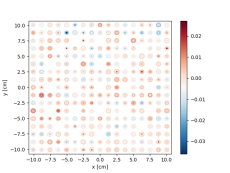Quantifying Systematic Error in Monte Carlo Simulations

Observed bias (relative error compared to reference solution) in flux distribution in a single assembly of a small modular reactor (SMR) model.
Scientific Achievement
Quantifying the potential bias in Monte Carlo eigenvalue simulations due to undersampling (too few particles per fission generation) has been difficult historically because of the computational resources required to obtain reference solutions. Using an ALCC grant on the Cori supercomputer, we obtained finely discretized flux solutions to a small modular reactor (SMR) problem with extremely small statistical error that has allowed us to definitely quantify undersampling biases.
Significance and Impact
The results of this study represent the first detailed look at local tally bias due to undersampling in a light-water reactor. The conclusions of the study will help to better inform reactor analysts how different Monte Carlo run strategies can affect bias and what fission generation sizes are necessary.
Research Details
Simulations of a 37-assembly light-water reactor model were carried out using 105, 106, 107, 108, and 109 particles per generation. The flux over fuel pins divided into 10 rings and 196 axial segments was tallied. Convergence was considered to be reached when 95% of the tallies had a 95% confidence interval half-width of less than 1% of the sample mean. For each generation size, 30 independent simulations were run to obtain an uncorrelated standard deviation of the mean. Altogether, the simulations required about 15M core-hours on the Cori supercomputer.
About NERSC and Berkeley Lab
The National Energy Research Scientific Computing Center (NERSC) is a U.S. Department of Energy Office of Science User Facility that serves as the primary high performance computing center for scientific research sponsored by the Office of Science. Located at Lawrence Berkeley National Laboratory, NERSC serves almost 10,000 scientists at national laboratories and universities researching a wide range of problems in climate, fusion energy, materials science, physics, chemistry, computational biology, and other disciplines. Berkeley Lab is a DOE national laboratory located in Berkeley, California. It conducts unclassified scientific research and is managed by the University of California for the U.S. Department of Energy. »Learn more about computing sciences at Berkeley Lab.







